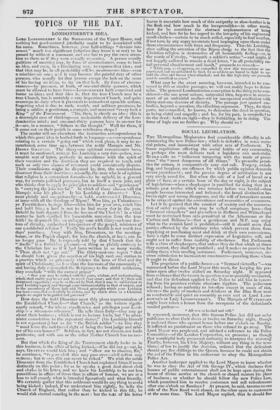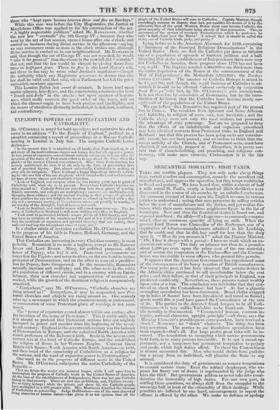SOCIAL LEGISLATION.
THE Metropolitan Magistrates find considerable difficulty in ad- ministering the new Police-law ; which is defective in some mate- rial points, and inconsistent with other acts of Parliament. To frame regulations affecting the social habits of any conununity, is perhaps the most delicate task a legislator can undertake. Bemis calls an " indiscreet tampering with the trade of provi- sions" the " most dangerous of all things." To prescribe penal- ties for crimes, is comparatively easy and safe. Forgery, swind- ling, and burglary, are offences for which public opinion demands severe punishment ; and the precise degree of retribution is not very nicely cared for. But when the sale of a loaf of bread or a glass of beer, at a certain hour of the day or night, is the subject of legislation—when a shopkeeper is punished for doing that at a minute past twelve which two minutes before was lawful—then people become interested and irritated ; the broad distinction be- tween right and wrong disappears, and the will of lawmakers seems to be arrayed against the convenience and necessities of consumers.
Let it be granted that the comfort of society and the conserva- tion of order require what may be called sumptuary laws—that " licensed victuallers" and gin-sellers in Holborn and Whitechapel must be restrained from acts permitted at the Athendeum or the Carlton and l3ellainy's—that a gentleman and M.P. may enjoy what to the swinish herd is prohibited—still it should seem that parties affected by the arbitrary rules which prevent them from supplying or purchasing meat and drink at their own convenience, have a right to some distinct expression of Legislative will, and ought not to suffer from inability of obedience. But Parliament tells a class of shopkeepers, that unless they do that which at times they cannot, they shall be punished ; and it makes no provhion for aiding them when needling assistance. Parliament, moreover, de- crees submission to inconsistent enactments—puzzling those whom it ought to direct.
The proprietor of a public-house—a " licensed victualler "—was summoned before the Lord Mayor this week, for keeping his pre- mises open after twelve o'clock on Saturday night. It appeared from evidence that the tavern in question was respectably conducted, and that the defendant applied to the Police to aid him in remov- ing from his premises certain obstinate tipplers. The policemen refused; having no authority to interfere except in cases of riot, whereas the party of smokers and drinkers at the Blue Boar were as comfortable and quiet an assembly as ever met at Lord LANS■ DOWNE'S Or Lady Loxoonnutay's. The Marquis of WATERFORD might have taken a lesson front the occupants of the defendant's sanded parlour- " All urns so hushed and still."
It appeared, moreover, that this famous Police Act did not order publicans to close their doors at twelve on Saturday night, though it mulcted those who opened house before one o'clock on Sunday. It inflicted no punishment on those who refused to go away. The Lord Mayor was perplexed, and advised a reference to the Police Committee—of the London Corporation, we presume; as though that worshipfial body possessed authority to interpret the statutes'i! Finally, however, his Civic Majesty, without any thing in the sem- blance of law to justify the decision, ordered that the defendant should pay five shillings to the Queen, because he could not obtain the aid of the Police in his endeavour to obey the Metropolitan Police Act.
Another innkeeper applied to the Lord Mayor to know whether
he was to obey the Act of 9th George IV., which declares that houses of public entertainment shall not be kept open during the hours of divine service at the church or chapel nearest his place of business ; or whether he should follow the new Police Law, which permitted him to receive customers and sell refreshments after one o'clock on Sundays ? At present, he said, taverns on one side of the New Road were closed, on the other open to customers at the same time. The Lord Mayor replied, that he should fine
those who "kept open houses between three and five on Sundays."_
While this case was before the City Magistrates, the Justice 'at Marylebone Office was applied to for his construction of the act. 41 A highly respectable publican" asked Mr. RAWLINSON, whether the new law " overrode" the 9th George IV.; because they who went by the act of last session, opened house after one o'clock, and carried on business during divine service in the afternoon—saying, we may commence trade as soon as the clock strikes one, although divine service is carried on in our neighbourhood. Mr. Raweixsox said, that though the act of George IV. was not repealed, he would " take it for granted" that the clause in the new bill did "override" that act, and that the law would be obeyed by closing doors from three to half-past four. Three to fire is the Lord .Mayor's will, and three to ten may be some other Justice's regulation—though the authority which any Magistrate possesses to decree that this law shall be valid and that void, when Parliament has left the point undecided, nowhere appears.
This London Police Act carat de mininds. It bears hard upon marble-players, kite-flyers, and the entertaining criminals who bawl " Pouch and Judy" in the streiAs : but upon matters of import- ance, which really concern the good order of the town, and on which the clauses ought to have been precise and intelligible, and the means of obedience distinctly indicated, it is deficient, confused, and contradictory.



























 Previous page
Previous page